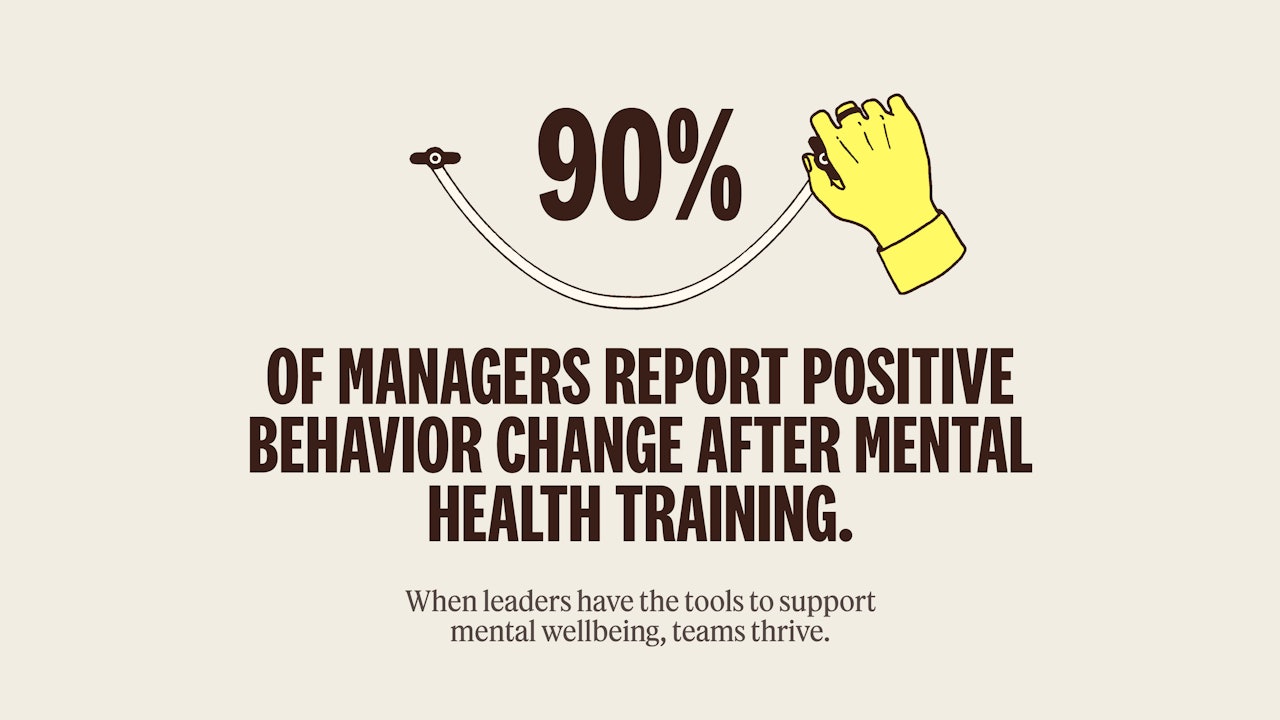Managers Aren’t Therapists – But They Still Shape Mental Health

Raya Moshiri
02 July 2025

Content
- Managers Aren’t Therapists – But They Still Shape Mental Health
- Where managers make the biggest difference
- Boundaries matter – here’s what managers aren’t responsible for
- A manager’s actual role in supporting mental health at work
Managers Aren’t Therapists – But They Still Shape Mental Health
Managers aren’t mental health professionals – and they shouldn’t be expected to act like one. But they do play a significant role in shaping how psychologically safe, supported, and mentally healthy their teams feel at work.
It’s a tricky space to navigate. Many managers genuinely care about their teams but feel unsure how to approach mental health conversations. There’s a fear of saying the wrong thing, overstepping boundaries, or taking on emotional responsibility they’re not trained for.
Others avoid the topic entirely – not because they don’t care, but because they don’t feel equipped to handle it well. That silence can send the wrong message: that mental health isn’t part of the workplace conversation.
But with the right clarity, tools, and boundaries, managers can support their teams in meaningful ways, without becoming therapists in the process.
Where managers make the biggest difference
The day-to-day experience of work – how stressful, supportive, or psychologically safe it feels – is often shaped by people leaders. It shows up in how feedback is handled, how deadlines are managed, and whether people feel able to speak up when they’re struggling.
Psychological safety, for example, doesn’t happen by accident. It’s built through small, everyday actions, like:
- Encouraging open dialogue without judgment
- Creating space for people to ask questions or admit mistakes
- Showing care when someone flags they’re struggling, rather than dismissing it
These moments influence whether employees feel supported – or isolated. And managers are often the first to notice when something’s off, whether it’s a change in energy, behavior, or communication. The question is whether they feel confident to step in, or whether they avoid the conversation altogether.
Boundaries matter – here’s what managers aren’t responsible for
It’s important to be clear: Managers aren’t there to diagnose, counsel, or treat mental health conditions. That work belongs to qualified professionals.
Without clear expectations, leaders can easily fall into one of two patterns:
- Taking on emotional burdens they’re not equipped to carry, which can lead to burnout, frustration, and blurred professional boundaries
- Avoiding mental health conversations entirely, which leaves employees isolated and sends the signal that wellbeing isn’t supported at work
Neither approach is sustainable – for individuals, teams, or the organization.
The goal is to equip managers to support mental health in ways that feel safe, structured, and within their role.
A manager’s actual role in supporting mental health at work
Most managers want to help their teams – they just need the right tools and understanding. That means building confidence to:
- Spot early signs of stress, disengagement, or burnout
- Have real conversations about wellbeing, without feeling out of their depth
- Model healthy boundaries and behaviors, like respecting work-life balance
- Know where to signpost employees for professional support
Supporting mental health at work isn’t about turning managers into experts – it’s about giving them the language, structure, and confidence to lead well.
That’s where technology can play a valuable role. Tools like Nova, for example, give managers a safe space to practice difficult conversations, build confidence, and strengthen skills like empathetic leadership. Whether it’s role-playing a wellbeing check-in or exploring how to handle sensitive topics, these tools offer a practical way to turn knowledge into action – without the high stakes of real-time conversations.
When organizations invest in this kind of support, and when leaders create environments where psychological safety is part of daily team life – everyone benefits. Mental health stops being a side conversation and becomes part of building strong, resilient, high-performing teams.
Because mentally healthy teams don’t happen by accident – they’re built, together, through the right tools, clear boundaries, and shared responsibility.
See how Unmind can help your managers support mental health.
About the Author

Raya Moshiri, Marketing Associate
I’m Raya Moshiri, and I help organizations bring proactive mental health support to life by coordinating programs, resources, and experiences that drive engagement and real-world impact. Based in New York, I’m dedicated to making workplace wellbeing both attainable and actionable.
About the Author

Raya Moshiri, Marketing Associate
I’m Raya Moshiri, and I help organizations bring proactive mental health support to life by coordinating programs, resources, and experiences that drive engagement and real-world impact. Based in New York, I’m dedicated to making workplace wellbeing both attainable and actionable.